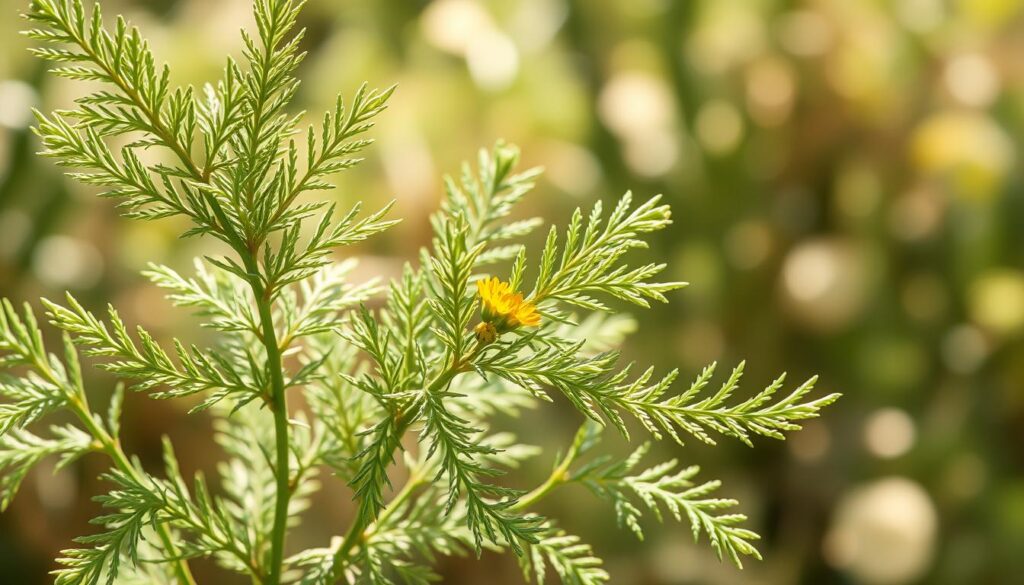Have you ever thought about a natural remedy that has lasted for centuries? Artemisia absinthium, or wormwood, is a fascinating bitter herb. It has a long history in Europe, North Africa, and Western Asia.
This natural remedy has caught the attention of many for a long time. It has been used in traditional medicine and is now studied by scientists. Wormwood is a powerful plant with many possible health benefits.
The wormwood plant is unique, with compounds that interest doctors all over the world. Its strong properties make it a key area of study in natural medicine.
Key Takeaways
- Artemisia absinthium originates from Europe and surrounding regions
- Wormwood contains powerful chemical components with possible health benefits
- Traditional medicine has used this herb for centuries
- Modern research continues to explore its therapeutic uses
- Careful usage is recommended due to its potent chemical composition
Understanding Wormwood: An Ancient Medicinal Plant
Wormwood is a remarkable medicinal plant with a long history. It has been used for centuries in traditional medicine. This herbal supplement offers a glimpse into natural healing.
Origins and Botanical Classification
The Artemisia genus, which includes wormwood, comes from temperate regions of Europe, Asia, and North Africa. Known scientifically as Artemisia absinthium, it belongs to the Asteraceae family.
- Native regions: Europe and Asia
- Plant family: Asteraceae
- Scientific name: Artemisia absinthium
Traditional Uses Throughout History
Ancient cultures valued wormwood for its medicinal properties. Greeks, Romans, and traditional healers used it to treat various health issues.
“Wormwood has been a cornerstone of traditional medicine for thousands of years” – Herbal Medicine Practitioners
Different Species of Wormwood
There are many wormwood species, each with its own benefits. European wormwood (Artemisia absinthium) and African wormwood (Artemisia afra) are two well-known types.
| Species | Origin | Traditional Use |
|---|---|---|
| Artemisia absinthium | Europe | Digestive support |
| Artemisia afra | Africa | Respiratory health |
Researchers are studying wormwood’s medicinal properties. They are discovering new uses for this herbal supplement.
The Rich History of Artemisia Absinthium in European Medicine

Wormwood has a long history in European medicine, captivating healers and scholars for ages. The wormwood bible book shows its deep cultural importance, tracing back to medieval Europe.
In medieval Europe, Artemisia absinthium was seen as a powerful healing herb. Scholars called it “the most important master against all exhaustions”, showing its great healing power. It was not just used in medicine but also in spiritual and folk practices.
“Wormwood appears in medical literature as early as the mid-5th century BCE, indicating its longstanding importance in healing traditions.”
Key Historical Applications
- Treating digestive system conditions
- Addressing liver and stomach ailments
- Managing issues like flatulence and jaundice
- Combating possible poisoning
Ancient doctors like Dioscorides listed 33 uses for wormwood. Mr. Wormwood’s success came from knowing wormwood’s many healing uses.
Cultural and Medical Transmission
The wormwood letters show how medical knowledge spread. From Greek texts to Arabic in the late 8th century, and then to Avicenna’s works, wormwood’s fame grew.
Scholars saw wormwood as having special healing properties. Avicenna said it was ‘warming’ and ‘drying’, showing the advanced medical knowledge of the time.
Important Note: Wormwood contains thujone, a potentially toxic substance. Always consult a healthcare professional before use.
Wormwood: A Herb with Potential Health Benefits
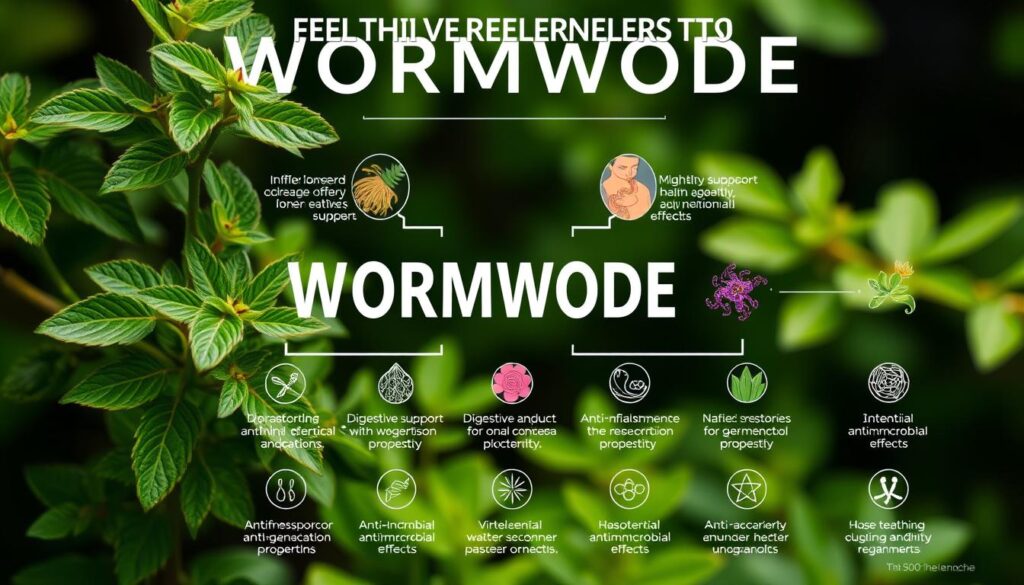
Wormwood is a remarkable herbal remedy with many health benefits. It has a long history of use in medicine. This history continues to interest both researchers and health enthusiasts today.
Digestive System Support
Wormwood is known for helping with digestive issues. Research shows it can be very effective:
- 80% of Crohn’s disease patients achieved clinical remission in a small study
- 65% of participants taking 1500mg daily showed almost complete symptom improvement
- Stimulates appetite and reduces bloating
Anti-inflammatory Benefits
Wormwood also has anti-inflammatory properties. This makes it a good natural option for fighting inflammation. Key findings include:
- Contains chamazulene, a potent antioxidant that fights oxidative stress
- Participants with knee osteoarthritis reported reduced pain after topical application
- Potential to alleviate symptoms of chronic inflammatory disorders
Antimicrobial Effects
Wormwood shows promise in fighting off parasites. Animal studies suggest it could be effective against certain parasites. More research is needed, though.
“Nature’s pharmacy often holds the most powerful healing secrets” – Traditional Herbal Medicine Proverb
Always talk to a healthcare professional before using wormwood. Everyone’s body reacts differently.
Chemical Composition and Active Compounds
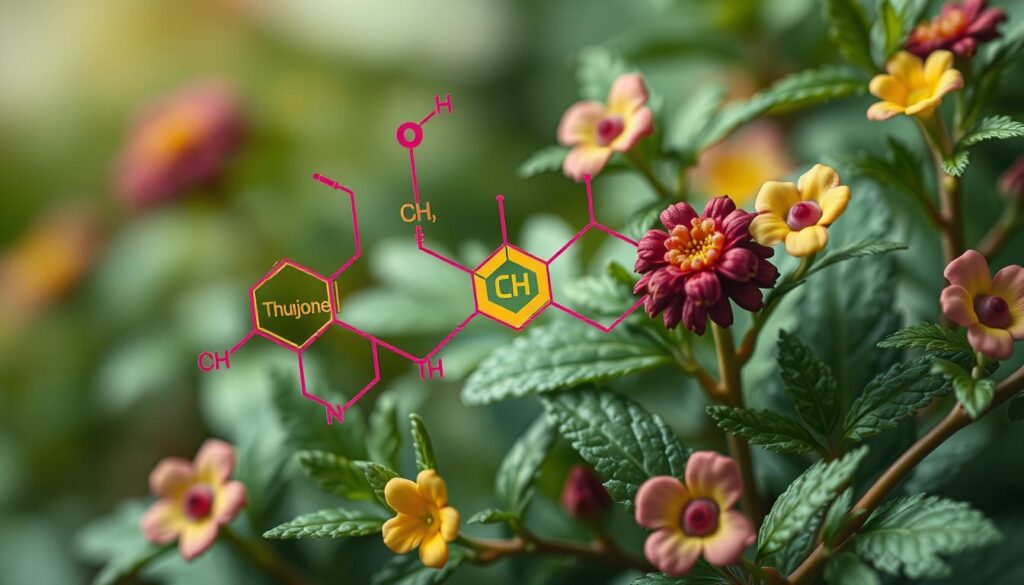
Wormwood is a botanical wonder that helps us understand human inner alchemy. It has a complex chemical makeup. This makeup includes many bioactive compounds that could help heal us.
Wormwood has several key compounds that support healing and meditation:
- Thujone: A compound with both healing and toxic effects
- Absinthin: A compound that helps with healing
- Terpenoids: Including trans-thujone, γ-terpinene, and 1,4-terpeniol
- Essential oils with diverse bioactive properties
Caution is key when exploring wormwood’s chemical makeup. It has about 0.2% absinthin. It also has 40-70 mg % of azulene, making it a strong botanical extract.
| Compound | Potential Effects | Concentration |
|---|---|---|
| Thujone | Stimulates nervous system | Variable |
| Absinthin | Medicinal efficacy | 0.2% |
| Essential Oils | Antimicrobial properties | Multiple compounds |
The chemical complexity of wormwood reveals nature’s complex healing power. It connects traditional wisdom with modern science.
Research shows we must be careful with wormwood. Too much can harm our minds and nerves. Knowing about these compounds helps us use wormwood wisely.
African Wormwood (Artemisia Afra): Traditional African Medicine
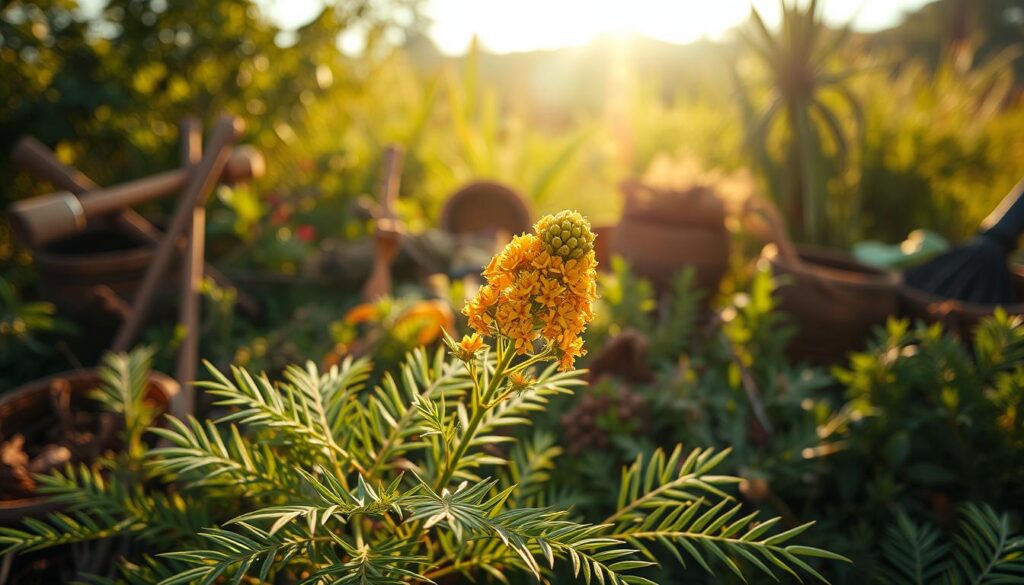
African wormwood unlocks the secrets of traditional healing. It has been a cornerstone for communities for generations. This herb holds deep cultural value across Africa, showing centuries of medicinal wisdom.
Cultural Heritage and Significance
In many African societies, Artemisia afra is more than a plant. It’s a symbol of healing and cultural identity. Indigenous communities have valued its medicinal powers for ages, sharing knowledge through generations.
- Used in spiritual and healing rituals
- Integral to community healthcare practices
- Symbolizes connection between nature and human wellness
Medicinal Applications
The wormwood the isolationist approach to healing is versatile. African wormwood treats many health issues. It’s traditionally used for:
- Respiratory ailments (colds, coughs, influenza)
- Digestive system support
- Pain management
- Immune system enhancement
Modern Research Findings
Scientists are exploring the wormwood mutiny’s disease-fighting abilities. Research shows promising results in:
- Anti-inflammatory properties
- Antimicrobial effects
- Potential anti-cancer activities
“African Wormwood represents a bridge between traditional knowledge and modern scientific understanding of herbal medicine.” – Traditional Herbal Medicine Research Institute
Disclaimer: This information is for general knowledge purposes only. Always consult healthcare professionals before using any herbal remedies.
Therapeutic Applications in Modern Herbalism
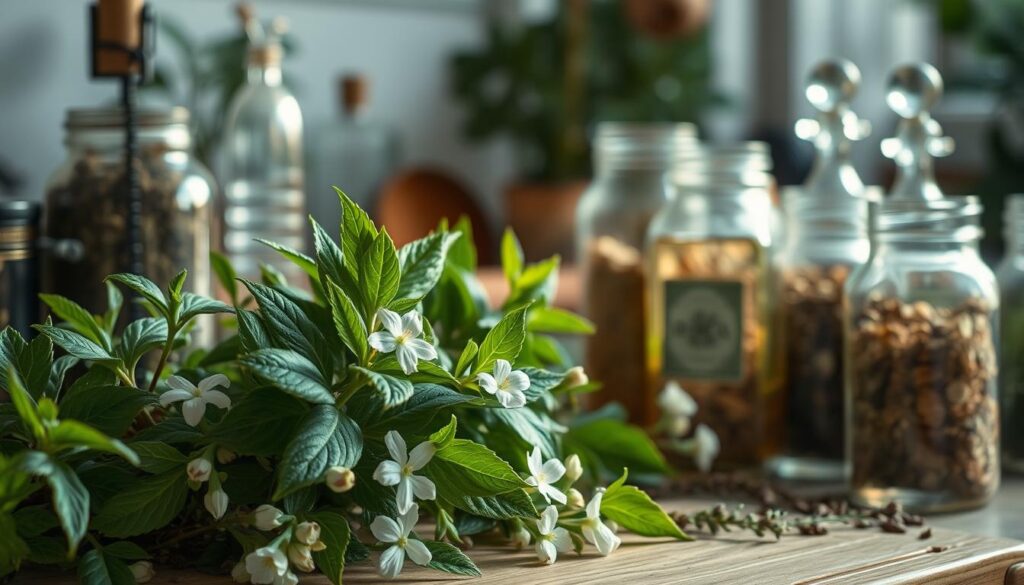
Discover the secret to amazing health with wormwood. This versatile herb is packed with healing power. It’s a key player in natural health.
Wormwood helps in many ways, tackling different health issues. The wormwood bible shows its wide range of benefits for wellness.
- Digestive System Support
Stimulates digestive fluid production- Improves appetite
- Enhances nutrient absorption
- Antiparasitic Properties
- Helps eliminate intestinal parasites
- Supports gastrointestinal health
- Immune System Enhancement
- Boosts overall immune function
- Provides natural defense mechanisms
“Nature’s pharmacy offers profound healing through ancient botanical wisdom” – Herbal Medicine Practitioner
Want to tackle chronic health problems? Wormwood might be the answer. It has many uses, from fighting inflammation to boosting immunity.
| Health Benefit | Potential Applications |
|---|---|
| Digestive Health | Stimulate digestion, reduce bloating |
| Immune Support | Enhance immune system response |
| Anti-inflammatory | Reduce systemic inflammation |
Wormwood looks promising, but talk to a doctor before using it. It’s important to use it safely and correctly.
Safety Considerations and Possible Side Effects

Wormwood is a strong herb that needs careful use. When exploring the secret world of plants, knowing the safety of wormwood is key.
The FDA has strict rules for wormwood use. Important safety points include:
- Thujone content is limited to 10 parts per million (ppm)
- Long-term use is not recommended beyond 4 weeks
- Potential side effects can include digestive issues and neurological complications
Recommended Dosage
Be cautious with wormwood. Clinical studies suggest specific dosages:
- Knee osteoarthritis treatment: 3% topical ointment applied three times daily
- Crohn’s disease management: 500-mg supplement three times daily
- Maximum duration: 4 weeks of continuous use
Contraindications
Some people should not use wormwood. High-risk groups include:
- Pregnant women
- Individuals with pre-existing liver conditions
- People taking central nervous system medications
Drug Interactions
Caution is key when using wormwood with other drugs. It can interact with:
- Liver metabolism medications
- Neurological prescriptions
- Blood thinners
“Like understanding how to unlock all three unforgivable curses in Harry Potter, knowing wormwood’s safe usage requires deep knowledge and respect for its power.”
Always talk to a healthcare professional before using wormwood. Its complex nature needs a careful and informed approach.
Harvesting and Preparation Methods
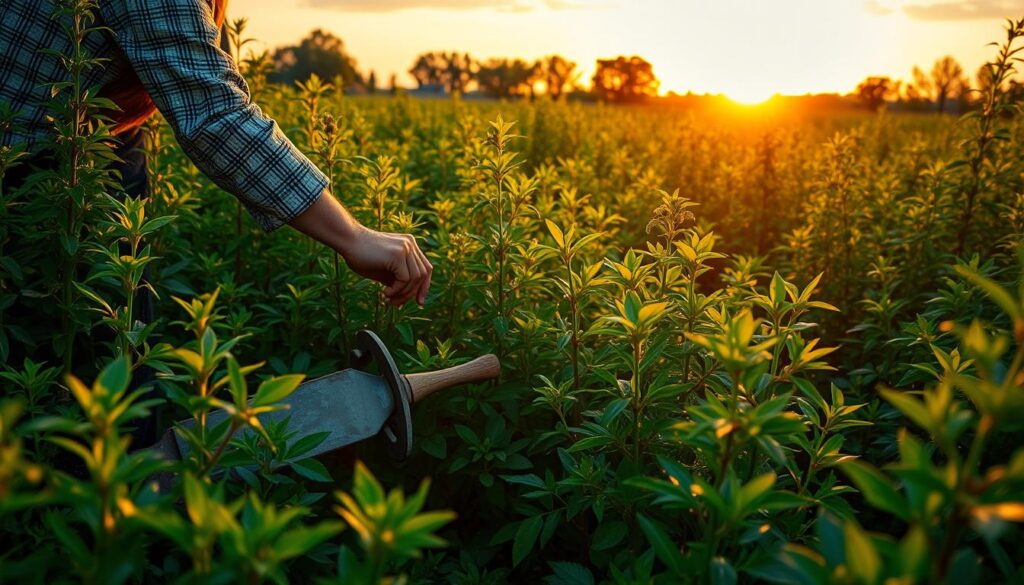
Timing is key when harvesting wormwood. The chamber of secrets world of sorcery makes it a special task. You should pick it when it’s most potent, just before it flowers.
- Harvest during dry, sunny mornings
- Use clean, sharp cutting tools
- Cut stems about 4-6 inches above ground
- Leave at least 20% of the plant community intact
Drying wormwood right is important to keep its health benefits. The chamber of secrets world of sorcery roblox shows that keeping it fresh is key. Dry it in a dehydrator at 90°F for 1-4 hours.
“In harvesting wormwood, respect for the plant and its environment is key.” – Traditional Herbal Wisdom
How you store wormwood is also important. Use paper satchels or glass containers to keep it fresh. Avoid plastic.
| Preparation Method | Best Use | Recommended Dosage |
|---|---|---|
| Tea Infusion | Digestive Support | 1-2 cups daily |
| Tincture | Concentrated Extract | 10-20 drops, 3x daily |
| Essential Oil | Topical Application | Diluted, as directed |
Learning about herbal preparation, like secrets of dr wu, needs focus. Always talk to a professional herbalist before trying new herbs.
Disclaimer: This info is for general knowledge and not medical advice.
Wormwood in Natural Medicine Practices

Wormwood is a key part of many healing traditions worldwide. It shows us the deep wisdom in natural medicine. This herb is at the heart of discovering human inner alchemy.
Wormwood is important in many traditional medicines. Each tradition offers its own view of how it can help us.
Traditional Chinese Medicine Perspectives
In Traditional Chinese Medicine, wormwood is seen as a strong healing tool. It has special energy properties. Practitioners use it for:
- Balancing internal energy meridians
- Supporting digestive system function
- Addressing parasitic infections
- Promoting liver health
Western Herbal Medicine Applications
Western herbalists see wormwood as helpful for many health issues. Its bitter parts help with digestion. It may also:
- Improve appetite
- Reduce digestive inflammation
- Help get rid of parasites
- Boost digestive system health
Ayurvedic Healing Approaches
Ayurvedic experts see wormwood as a strong detoxifier. The wormwood mutiny pdf shows its role in holistic healing.
“In the realm of herbal medicine, wormwood represents a bridge between ancient wisdom and modern understanding.” – Herbal Medicine Experts
These traditional views are interesting, but always talk to a doctor before using wormwood.
Environmental Impact and Sustainable Cultivation

Wormwood is a remarkable plant with big environmental benefits. It’s great for sustainable farming and taking care of ecosystems. People who practice sic awakening, healing, and meditation see wormwood’s deep connection to nature.
Wormwood grows well in many places. It can handle tough conditions, making it perfect for fixing damaged land.
- Grows in altitudes ranging from sea level to 2,700 meters
- Demonstrates resilience in temperate and mountainous regions
- Provides natural pest management capabilities
Wormwood’s antimalarial properties are not just for medicine. They also help in farming in a green way.
| Environmental Benefit | Impact |
|---|---|
| Soil Conservation | Reduces erosion, improves soil structure |
| Natural Pest Control | Reduces chemical pesticide dependency |
| Biodiversity Support | Provides habitat for beneficial insects |
It’s important to grow wormwood responsibly. This way, we avoid harm while getting its benefits.
“Nature provides the most sophisticated solutions when we understand its intricacies.” – Ecological Research Insight
How you grow wormwood can help make farming better for the planet. It supports both nature and traditional healing.
Scientific Research and Future Potential
Wormwood research is showing great promise for unlocking extraordinary health. Scientists are studying its medicinal properties, focusing on artemisinin. This compound is seen as a major breakthrough in medicine.
Studies show wormwood’s bioactive compounds could fight chronic diseases. Research on Artemisia scoparia shows it can lower insulin and glucose levels. This could lead to new treatments for metabolic disorders.
Research worldwide is deepening our understanding of wormwood’s healing powers. From ancient practices in Pakistan, Afghanistan, and China to modern labs, scientists are learning more. They aim to create targeted treatments that use the plant’s natural healing without side effects.
Exploring wormwood’s scientific side is just starting. As research grows, we’ll see more advanced medical uses of this plant. The blend of old wisdom and new science could bring big changes to natural health care.

